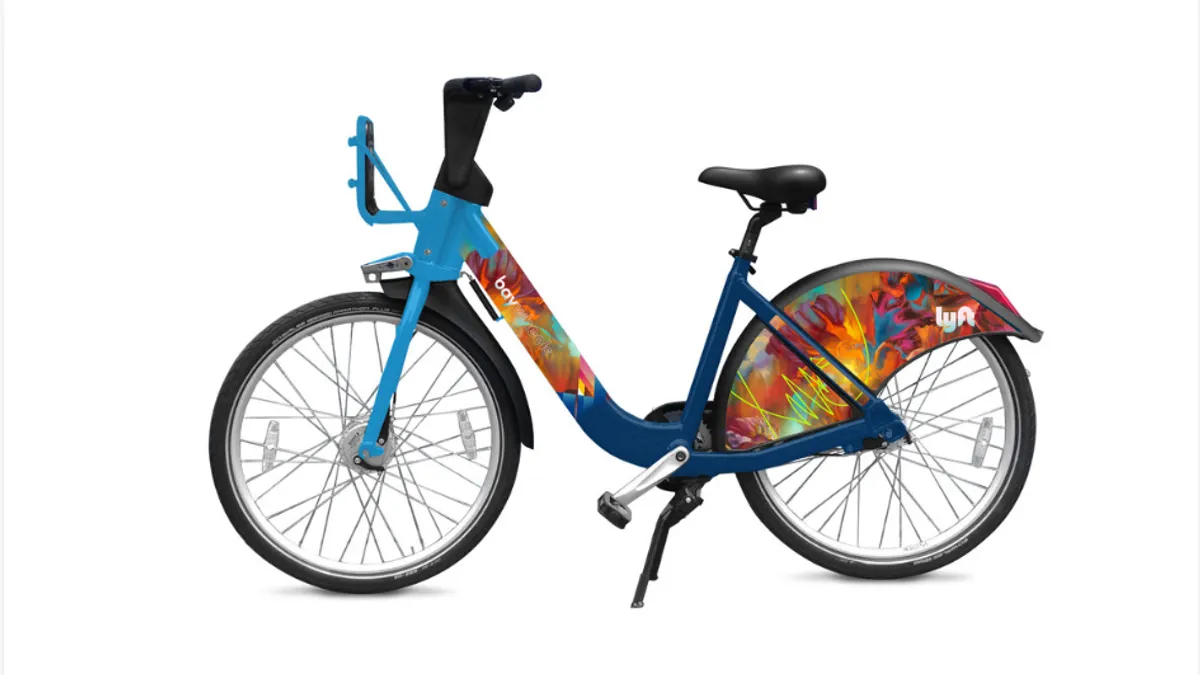Dive Brief:
- Lyft has rebranded the San Francisco Bay Area's bike-share program from Ford GoBike to Bay Wheels.
- The company is also launching an e-bike that debuted in San Jose yesterday and will expand throughout the Bay Area in the coming weeks. Those bikes can be rented through the Lyft app, while traditional pedal bikes still can be accessed through the bike-share program app. The e-bikes will feature a lock so they can be parked places besides a bike-share docking station, qualifying them as dockless devices.
- The traditional pedal bikes will now display artist designs to become what Lyft refers to as "mobile art." The e-bikes will have black frames with wheels in the company's signature pink color.
Dive Insight:
Bike-share first came to San Francisco in 2013 and the system underwent a rebranding in 2017 to reflect Ford's sponsorship. The new rebranding eliminates the perceived separation of the bike-share program from its parent company, Motivate, which Lyft acquired last summer. It also advances Lyft's move away from being solely a ride-hailing company to a multimodal mobility company.
E-bikes are not a new concept for Lyft. The company had them in select markets until April, when it pulled several thousand of them from New York, San Francisco and Washington, DC over problems with excessively strong braking on the front wheel. Lyft told Smart Cities Dive its new e-bikes are completely new models with different components, including a different front wheel brake. E-bikes will be reintroduced to New York's Citi Bike fleet in the fall.
The introduction of the dockless e-bikes is causing some contention in the Bay Area. Last month, the San Francisco Municipal Transportation Agency (SFMTA) made public its intention to vastly expand its dockless bike program, which began as a pilot in January 2018 with e-bike operator Jump. SFMTA encourages all dockless bike-share operators to submit new permit applications by June 24.
But last week, Lyft sued San Francisco and the SFMTA to prevent the city from granting permits to dockless competitorss. It said issuing new permits violates Lyft's 10-year, exclusive contract to provide a bike-share program in the region. San Francisco counters that the contract only covers traditional bike-share, not dockless.
The lawsuit contends that allowing Jump to operate in the city — a deal that expires in July — was supposed to be temporary because Motivate wasn't ready to release e-bikes yet.
Other cities have grappled with how to handle bike-share exclusivity agreements in the age of dockless. The issue came up earlier this year when Chicago proposed expanding and improving the city's bike-share, also owned by Lyft. All of the new bikes added to the system will be e-bikes, marking Chicago's official entry into the dockless space following its six-month pilot last year.
Chicago's amended contract with Lyft does not specify whether the exclusivity agreement extends to dockless devices and therefore would preclude dockless competitors from entering the market. San Diego faced a similiar conundrum in 2017 that led the city to investigate whether its exclusivity agreement with DecoBike allowed it to pursue a dockless program.













